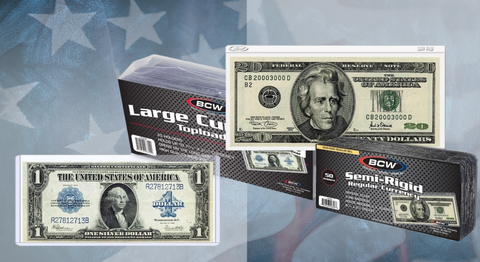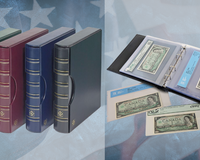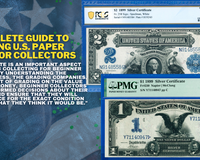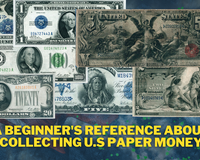As a collector, your paper money collection is a valuable hobby that requires careful attention and protection. Collecting paper money is a popular hobby for many people. These small pieces of history and art hold great value, both monetarily and sentimentally. As a collector, it is important to understand the crucial role that proper storage plays in protecting and preserving the condition of your paper money collection.
To ensure that your collection remains in pristine condition, it is essential to store it properly. The environment in which you store your notes can have a profound impact on their condition and value. From handling to temperature and humidity levels, every detail counts when it comes to protecting your collection.
Paper Money Storage Supply:
Paper Money Sleeve
The first and perhaps most obvious benefit of currency sleeves is protection from physical damage. Your notes are delicate, and even the smallest crease or tear can significantly impact their value. Currency sleeves provide a barrier between your notes and the outside world, preventing accidental damage and protecting your collection.

Currency sleeves are also an excellent tool for organizing your collection. With clear plastic sleeves, you can easily see and access your notes, making it simple to keep track of your collection and identify any potential issues. Additionally, currency sleeves allow you to store your notes vertically, which is ideal for minimizing damage and preserving their condition.
There are two main types of currency sleeves: Clear Semi-Rigid plastic and Rigid PVC plastic sleeves. Both types of sleeves are designed to protect your paper money from damage and preserve its condition. Clear Semi-Rigid sleeves are made from a durable, acid-free plastic material that provides a clear view of your notes. These sleeves are lightweight, affordable, and easily accessible. Rigid PVC plastic sleeves, on the other hand, offer more robust protection for your notes. These sleeves are made from a sturdy plastic material that is designed to protect your notes from physical damage.
Paper Money Album Holder
In addition to currency sleeves, another important aspect of proper storage for paper money is buying a high-quality paper money album. A paper money album provides a safe and secure place to store your collection, while also allowing you to easily view and organize your notes. When choosing a paper money album, it is important to select one that is designed specifically for currency.

These albums are typically made from acid-free materials and have clear plastic pages to set your notes in. They are also designed with a three-ring mechanism that allows you to easily add or remove pages, making it easy to grow your collection over time. Another important factor to consider when selecting a paper money album is size. It is important to choose an album or binder that is the appropriate size for your collection, as this will ensure that your notes are properly protected and stored.
Several suppliers sell currency protectors, including:
- Capital Plastics - They are a manufacturer of hard plastic coin holders for the protection of coins, currency, medals, medallions, tokens, gaming chips, discs, pictures, and documents.
- BCW Supplies - BCW offers a wide range of collectible items from disks, coins, and paper money.
- Lighthouse - provides a broad range of supplies and tools for currency collectors including folders, holders...
The Importance Of Humidity On Paper Money Storage
Aside from choosing the right currency sleeves and paper money album, it is also important to consider the storage location for your collection. Your storage location must be humidity controlled, as excess humidity can cause damage to your notes over time. High humidity can cause the paper fibers to break down and the ink to bleed, making your notes unsightly and reducing their value. In extreme cases, high humidity can even cause mold and mildew to grow on the notes, further reducing their value and making them uncollectible.
An ideal storage location for paper money is safe, as it provides both protection from theft and a secure environment for your collection. The safe should be humidity controlled, with the humidity levels maintained between 30-50%. This will help to prevent any damage caused by excess humidity.
In addition, it is recommended to store your paper money collection in a climate-controlled room, as temperature fluctuations can also cause damage to your notes over time. The ideal temperature for storing paper money is no more than 75 degrees Fahrenheit. This will help to prevent any fading or discoloration caused by heat exposure.
It is also important to avoid storing your paper money collection in direct sunlight or near heat sources, as this can cause the notes to deteriorate quickly. Instead, store your collection in a cool, dry, and well-lit location, where it can be easily viewed and admired.
The Proper Way To Handle Your Collection
Handling paper money is an inevitable part of collecting and managing your collection, but it is important to be mindful of how you handle the notes. Bare-hand handling can cause damage to the notes, reducing their value and compromising the condition of your collection.
Paper money from your collection can become stained and ruined due to the oils and grime from your hands adhering to it. This can gradually lower the value of your collection and make your notes less appealing to buyers and collectors. It is advised to use gloves when handling the notes in order to prevent damage to your paper currency. This will ensure that your collection stays in excellent shape for many years to come by preventing oils and other contaminants from spreading to the notes. It's crucial to have clean, dry hands if you have to handle paper money without gloves.
Get Your Collection Graded By Leading Third-Party Grading Companies
Getting your notes protected by a grading service from a reputable grading company is a great way to protect the value and condition of your paper money collection. These companies specialize in evaluating the condition and authenticity of paper money, providing collectors with a reliable and accurate assessment of their notes.

Once a note has been graded, it is encapsulated in a clear plastic case with a label indicating the assigned grade. This provides a level of protection for the note, as well as a means of verifying its condition and authenticity. The encapsulated notes are also easier to store and display, as the clear plastic holder protects the notes from damage and dirt, while the label provides easy identification of the grade and condition.
The grading process itself is rigorous and involves a team of experienced professionals who examine the notes in detail, taking into account factors such as centering, margins, wear, tear, and overall eye appeal. The assigned grade is based on strict standards and guidelines, providing collectors with a trustworthy and impartial evaluation of their notes. Some of the most well-known grading companies include:
- Professional Coin Grading Service (PCGS) - PCGS is one of the largest and most respected grading companies, with a focus on coins and paper money. They offer a wide range of grading services, including certification, encapsulation, and secure storage.
- Paper Money Guaranty (PMG) - PMG is a specialist grading company that focuses exclusively on paper money. They offer a comprehensive grading service, including certification, encapsulation, and secure storage.
When you submit your paper money to a grading company, they will evaluate the condition of each note and assign it a score or grade. This not only protects the note from further damage but also provides a way to accurately assess its value. By using the services of a grading company, you can ensure that your paper money collection is well protected and its value is accurately assessed. This is especially important for collectors who are looking to buy or sell notes, as the grading score or grade can have a significant impact on the value of the note.

While the benefits of a grading service are clear, it is important to be aware of the obstacles that come with it. One of the biggest obstacles is the cost involved, which includes a membership fee as well as a grading fee. In addition, there is often a waiting period of several months, during which time the notes are evaluated and encapsulated.
The membership fee can vary depending on the grading company, but it is typically an annual fee that provides collectors with access to the grading services and other benefits offered by the company. The grading fee, on the other hand, is a fee that is charged per note and covers the cost of evaluating and encapsulating the notes.
The waiting period can also be a hindrance, especially for collectors who are eager to have their notes evaluated and encapsulated. While the wait time varies depending on the grading company, it can be several months before the notes are returned, and this can be a long time to wait for someone eager to see their notes graded and protected
By following the best practices and tips outlined in this guide, you can protect and preserve your paper money collection for years to come. With the right supplies and techniques, you can ensure that your collection remains in great condition and retain its value over time. So, whether you are a seasoned collector or just starting out, this guide is an essential resource for protecting and preserving your paper money collection.









1 comment
James Carl Shields, Jr.
I have a large quantity of “Star Notes” circulated. I acquire my coun and bill collections from non collected places, stores, bars, change at purchases, etc. I want to protect my Star Notes and older U.S. currency; coins and notes as best that I can being a novice. Having said that my main concern is the preservation of my currency right now.
Thanking you in advance.
Jimmy